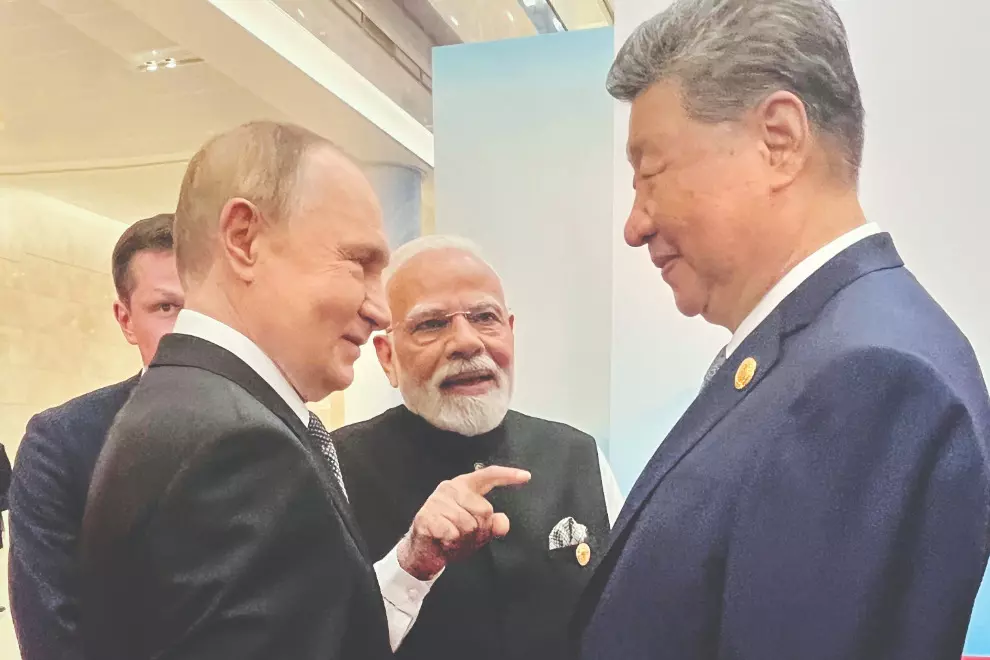India shows defiance to US pressure through strategic SCO engagement with China, Russia

TIANJIN: Prime Minister Narendra Modi on Monday concluded a “productive” visit to China, where he attended the Shanghai Cooperation Organisation (SCO) summit in the port city, held bilateral talks with leaders including Chinese President Xi Jinping and Russian President Vladimir Putin, and welcomed the grouping’s unanimous condemnation of the Pahalgam terror attack along with its assertion that “double standards” in combating terrorism are unacceptable.
India utilised its participation in the Shanghai Cooperation Organisation (SCO) summit to recalibrate diplomatic relationships with both China and Russia, adjusting its strategic positioning amid evolving global trade tensions. The two-day summit in Tianjin, bringing together leaders from ten nations, demonstrated collective defiance to American pressure regarding India’s bilateral ties with Beijing and Moscow.
The prime minister, on the final leg of his two-nation visit, said in a social media post that he highlighted India’s position on “key global issues.”
“Concluding a productive visit to China, where I attended the SCO Summit and interacted with various world leaders. Also highlighted India’s stand on key global issues,” Modi wrote on X.
Earlier on Monday, the SCO strongly condemned the Pahalgam terror attack and aligned with India’s stance that “double standards” in the fight against terrorism are unacceptable. The grouping listed its strong resolve to combat terrorism in a declaration unveiled at the end of its two-day annual summit, attended by Modi, Xi Jinping, Vladimir Putin, and other global leaders.
The SCO member states also condemned the military strikes by Israel in Gaza, citing numerous civilian casualties and a catastrophic humanitarian situation. The terror attacks in Khuzdar and on the Jaffer Express in Pakistan’s Balochistan province were also condemned.
“They expressed their deepest sympathy and condolences to the families of the dead and the wounded and stated that perpetrators, organisers, and sponsors of such attacks must be brought to justice,” the declaration said.
Reaffirming its commitment to combat terrorism, separatism, and extremism, the SCO stressed the inadmissibility of using terrorist, separatist, and extremist groups for “mercenary purposes” and recognised the leading role of sovereign states in countering such threats.
“The member states strongly condemn terrorism in all its forms and manifestations, stress that double standards in the fight against terrorism are unacceptable, and call on the international community to combat terrorism, including cross-border movement of terrorists,” the declaration added. The SCO also highlighted the central role of the UN in implementing Security Council resolutions and the UN Global Counter-Terrorism Strategy to jointly combat all terrorist groups.
In his address, Modi said the Pahalgam attack was not only an assault on India’s conscience but an open challenge to every nation that believes in humanity. Speaking in the presence of Pakistan Prime Minister Shehbaz Sharif, Xi Jinping, and other leaders, Modi underscored that fighting terrorism is a responsibility “towards humanity”.
In a pointed reference to Pakistan, he said, “It is natural to ask — can the open support for terrorism by certain countries ever be acceptable to us?” He also noted that connectivity projects that bypass sovereignty lose both trust and meaning, an apparent reference to China’s Belt and Road Initiative passing through Pakistan-occupied Kashmir. The main theme of Modi’s address was a call for global unity against terrorism. “We must state it clearly and in one voice: double standards on terrorism are unacceptable. Together, we must oppose terrorism in every form and manifestation. This is our responsibility towards humanity,” he said.
Modi noted that no country, society, or citizen can consider themselves completely safe from terrorism. In response to the Pahalgam attack, India launched Operation Sindoor on May 7, targeting terrorist infrastructure in Pakistan-controlled territories. The strikes triggered four days of clashes, which ended with an understanding to halt military actions on May 10. He highlighted the human cost of terrorism in India over the past four decades: “Countless mothers have lost their children, and innumerable children have been left orphaned. Recently, we witnessed the most heinous face of terrorism in Pahalgam.” Modi also expressed gratitude to friendly nations that stood by India during this period of grief.
Elaborating on India’s vision for the SCO, he proposed an acronym: “S for Security, C for Connectivity, and O for Opportunity.” He said, “Security, peace, and stability form the foundation of any nation’s development. However, terrorism, separatism, and extremism remain major challenges.” Modi stressed that terrorism is a shared challenge for all humanity. “No country, no society, no citizen can consider themselves completely safe from it. That is why India has consistently stressed the importance of unity in the fight against terrorism.”
He also underscored connectivity’s role in regional growth, stating, “Every effort towards connectivity must uphold sovereignty and territorial integrity. Connectivity that bypasses sovereignty ultimately loses both trust and meaning.”
Finally, Modi proposed creating a Civilisational Dialogue Forum under the SCO and highlighted India’s development journey: “We are consistently pursuing wide-ranging reforms, which are creating new opportunities for both national development and international cooperation.”



